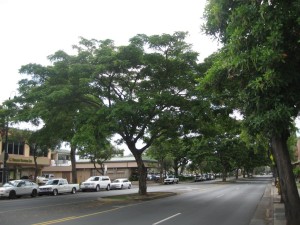Think Before Sacrificing on the Altar of Commerce
New legislation or community projects are often opposed by Chambers of Commerce or small business owners because the proposals are supposedly “anti-business.”
The classic example is the inevitable breast-beating we get whenever there’s a move to raise the minimum wage: My God, we can’t do that! It’s anti-business! Horse pucky! It just means the guy who owns 15 McDonalds stores will raise the price of Big Macs by a nickel.
We keep getting a variation of this theme from the Bush Administration in Washington: We don’t want to be anti-business, so we’ll let the market forces adjust and take care of the problem.
The truth is, business interests almost always conflict with the public interest. It’s not right and it’s not wrong; it’s just the way it is. The trouble is, we tend to forget that it is government’s responsibility to protect the public interest.
A number of years ago, in the town of Kailua on O’ahu, the City proposed a beautification project for the main business district. The idea was to create a grassy medial strip down the center of the road in which monkeypod shade trees would be planted. If there was ever such a thing as a no-brainer, this was it.
But wait! Merchants and store owners along the street opposed the plan because – Ready for this? – it would mean losing five on-street parking spaces! And that, of course, made the project anti-business.
Fortunately, level heads prevailed and the project got the green light. I don’t have a “before” photo, but this is what the street looks like today.
 Nice, isn’t it! Obviously, the town of Kailua is far better for it and, ironically, so are the damn fools who fought the project. Business is better than ever because Kailua is a quiet, attractive and – yes – shady place to spend money!
Nice, isn’t it! Obviously, the town of Kailua is far better for it and, ironically, so are the damn fools who fought the project. Business is better than ever because Kailua is a quiet, attractive and – yes – shady place to spend money!
So the next time you hear of a project in your community being opposed because “it won’t be good for business,” give it a little extra thought. Chances are excellent it would, in the long run, be very good for business … not to mention the community as a whole.




…and the campaign contributions.
Jim, it would be wonderful to have civic leaders with that much vision over here in Tidewater Virginia. They tend to kowtow to the so-called “developers”, who are happy to make the decisions.